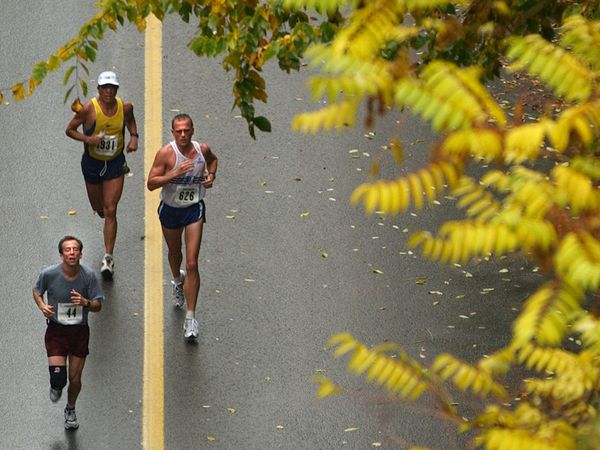
Runners compete in the Canadian International Marathon in Toronto on Oct. 14, 2001.J.P. Moczulski/The Globe and Mail
If you’re planning to tackle 26.2 miles (42 kilometres) in the fall, you’ve been busy this summer building up your weekly mileage.
There’s more to successful training than putting in the miles, though. The right nutrition plan is crucial to help you properly fuel for and recover from your runs.
If you haven’t yet given much thought to your nutrition, the following strategies can help maximize your performance during training and, ultimately, on race day.
Prioritize carbohydrates
A marathon-friendly diet should include enough calories to offset the extra ones you’re burning and adequate protein to prevent muscle loss and speed recovery.
Importantly, though, it also needs to feature carbohydrates at meals and snacks. Think whole grain bread, oats, brown rice, quinoa, farro, pasta, sweet potato, fruit and beans and lentils. Milk and yogurt deliver carbohydrates, too.
Once digested, carbohydrates are absorbed into the bloodstream as glucose. Glucose not immediately used for energy is stored in muscles as glycogen, the form that’s used to fuel exercise.
A regular training diet should include 5 to 8 g of carbohydrates for every kilogram you weigh. For a 160 pounds (73 kg) runner, that means consuming 365 to 585 g of carbohydrates a day.
For perspective, three cups of rice delivers 135 g of carbohydrates, 3 cups of cooked pasta have 100 g, 2 cups of mashed sweet potato supply 116 g, a large bagel has 55 g and two large bananas have 62 g.
Seven ways to reset your diet for back-to-work
Want a heart-healthy diet? Skip low-carb eating patterns like keto, paleo or Atkins
Time your pre-run meals, snacks
For runs under 90 minutes, you can rely on your muscle glycogen stores to get you through, provided, of course, your diet isn’t lacking carbohydrates.
If you’re running a longer duration, eat a carbohydrate-rich snack or light meal one to two hours prior. Limit fibre and fat, which leave the stomach more slowly; eating too much can cause digestive upset.
Easily digested pre-run snacks include fig bars, granola bars, energy bars, bananas or fruit smoothies. For breakfast, consider oatmeal with milk or toast with peanut butter and banana.
Carry carbs on long runs
During runs longer than 90 minutes, you’ll need to replenish your blood glucose when muscle glycogen stores are dwindling.
Consume 30 to 60 g of carbohydrates for every hour of running up to three hours, and 60 to 90 g per hour for longer runs. Start fuelling during the first 30 to 45 minutes of running.
You can get carbohydrates from a combination of sports drinks, energy gels or chews, energy bars or “waffles” and/or dried fruit. Check labels on commercial products to determine the grams of carbohydrate per serving.
Carbohydrate-load before your race
Your body can store only enough glycogen to fuel 60 to 90 minutes of running. Once it’s used up, performance will suffer.
Carbohydrate-loading for two to three days prior to the marathon while tapering training will optimize muscles glycogen stores and improve endurance during the marathon.
The idea isn’t to add more calories to your diet. Rather, it’s to increase the portion of carbohydrates at meals while decreasing the amount of protein and fats.
When carbohydrate-loading, runners need to consume an additional 200 to 300 g of carbohydrates a day. Instead of eating three meals loaded with carbohydrates, try five or six smaller carbohydrate-rich meals to prevent feeling overly full.
Practise carbohydrate-loading before long training runs leading up to the marathon.
Stay hydrated
Plain water is fine for runs lasting less than an hour. For longer runs, hydrate with a sports drink. Doing so replenishes water, electrolytes lost in sweat (especially sodium) and carbohydrates burned by your muscles.
Daily water requirements are 2.2 litres for females and 3.0 litres for males. You need more, of course, when exercising. Drink 500 ml of water two hours before a run and 150 to 350 ml every 10 to 20 minutes during a run.
Assess your hydration needs by checking your weight before and after long runs to make sure you haven’t lost more than 2 per cent of your body weight. For every pound lost, drink 500 to 750 ml of water.
The day before the marathon, sip water all day and monitor the colour of your urine to maintain a pale or transparent yellow colour.
Optimize nutrition on race day
To top off your glycogen stores, eat the breakfast you trained with three to four hours before the marathon (e.g., carbohydrate-rich with a little protein and fat).
Bring water and your race nutrition (e.g., energy gels, chews) to the start line, as well as a small snack (e.g., banana, energy bar) to eat one hour before start time.
After the marathon, consume 50 to 100 g of quickly digested carbohydrate (e.g., sports drink, banana, bagel, cereal bar) within 30 to 60 minutes, when your muscles are primed to replenish glycogen.
Eat a high-carbohydrate meal that contains protein within two hours to help replenish glycogen and repair muscles. Drink fluids every five to 10 minutes until your weight is back to pre-marathon level.
Leslie Beck, a Toronto-based private practice dietitian, is director of food and nutrition at Medcan. Follow her on Twitter @LeslieBeckRD
